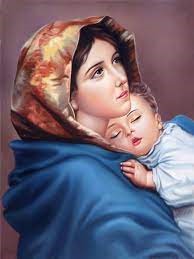

Why do we venerate saints and seek their intercession?
A common misconception about veneration to the saints is that we worship the saints. It has to be clear that there is none other than God, who is worthy of worship. Anything else is contrary to the 1st commandment. When we venerate and seek intercession from the saints, what we do is to ask them to pray for us.
In Revelations 5:8, we read about the twenty four elders who offer incense, which are the prayers of the saints. And again, in Rev 7:10; 14-17, we see that the martyrs worship and praise God, day and night before the throne of God.
We read in 1 Samuel 28:11-19 that Samuel, who was dead by then speaks to King Saul about the things that are yet to happen. Again, in St. Luke 9:8, we read about Moses and Elijah speaking to Jesus about the events that are yet to happen. Both Moses and Elijah had passed away centuries before this event. Jesus Christ himself taught us the parable of Lazarus and the rich man, where the rich man requests God to send Lazarus to warn his brothers who are alive (St. Luke 16:27-18). Hence, we know that the departed saints are in fact alive in spirit and are in active communion with God. The Church teaches that the departed saints can interact with humans and and are aware of the things that are yet to happen.
There are numerous Biblical references about seeking prayers from one another. For example, St. Paul in 1 Thessalonians 5:25 clearly asks the brothers and sisters in Christ to pray for him. Again, he asks for the prayers from the faithful in Romans 15:31.
Now we understand that it is Biblical to seek intercession and it doesn’t matter if they are alive or departed. And, why specifically to those who led a saintly life on earth? It is because “The prayer of a righteous person is powerful and effective” (James 5:16). It is also our moral duty to remember our forefathers who taught us the word of God. St. Paul reminds us in Hebrews 13:7 “Remember your leaders, who spoke the Word of God to you. Consider the outcome of their way of life and imitate their faith”.
To conclude, we now know from various Biblical references that:
Let us also understand that there is “One God and there is one mediator between God and men, the man Christ Jesus” (1 Timothy 2:5). This mediation is not to be confused with the intercessory prayers that we request from the saints. It is Jesus who gave away his life as ransom and redeem our souls from the clutches of sin and death. He is still mediating for us, sitting on the right hand of His Father (Romans 8:34). No one can replace the sacrifice that Jesus did, and he is the saviour of our souls from sin. So, the Apostles are right in teaching us that “Salvation is found in no one else, for there is no other name under heaven given to mankind by which we must be saved” (Acts 4:12).
St. Mary
Born of Joachim and Anna in the genealogical line of David, St. Mary was betrothed to St. Joseph. She was favoured to bear the Son of God and she was conceived by the Holy Sipirt when she accepted the message from Angel Gabriel. She is called “Theotokos” by the Church which is a Greek word that is roughly translated as “God bearer”.
St. Mary played a crucial role in the life of Jesus Christ, and was among the few who stayed back at the feet of the cross during the crucifixion of Jesus. The early church community that included the Holy Apostles gave St. Mary great respect and all the apostles were present while she ascended to heaven. It is understood that the churches that the apostle found were all in her name. (St. Mary’s church, Niranam is an example).
The Orthodox Church holds it as part of its faith article that St. Mary continued to be a virgin all her life, addressing her as the Virgin Mary or the Virgin Mother. It must be also stated that in the devotion of the Orthodox Church to St. Mary no role or description is made other than her being the Mother of God. In the iconographic tradition of the Church, St. Mary is usually presented as holding in her arms the child Jesus. Similarly, in the hymns which focus on St. Mary, she is asked to intercede to her Son, affirming the biblical principle that there is only one Mediator between God the Father and humankind. In fact, constant stress of the Church is on the fact that there is only one person, Jesus Christ, who has been exempt from the taint of humankind’s sin. It can, therefore, be inferred that the Orthodox Church does not believe that St. Mary was immaculately conceived or that she has a special mediatory role alongside Jesus Christ in the salvation of humankind.
